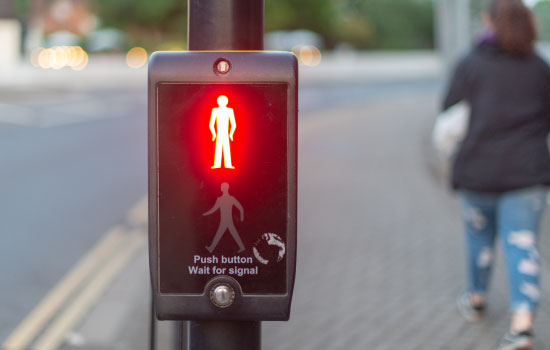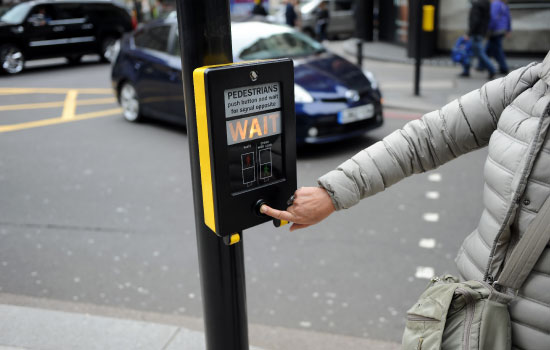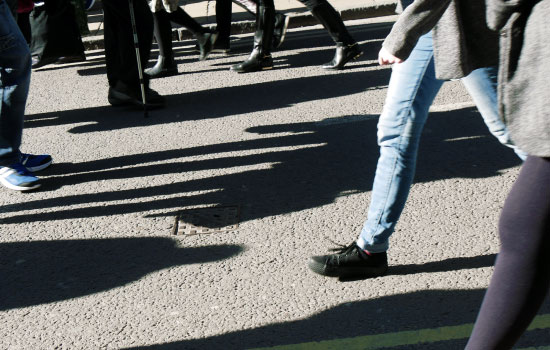“I was told it was a significant stroke, though it didn't take any of my motor abilities. I was told my face went a bit funny during the initial stage.
“For a week or two afterwards, I had a bit of left-side inattention, which is a lack of perceptual awareness.”
He pauses in recollection, adding with a smile, “So, they were a bit worried about me wandering near the edge of paths in case I fell off.”
Andrew says some colleagues were surprised to see him showing no apparent signs of having experienced a severe stroke.
“I think they expected to see somebody almost in a wheelchair or using a walking stick, but I wasn't at all.
“But it was obviously a very disorientating experience, and it was still a major one. The consultants at the hospital did warn me that it was potentially life-threatening.”
‘Hidden’ effects
In the weeks after Andrew’s stroke, it was noted by NHS occupational therapists (OTs) that his social awareness might have been affected.
He says, “I was a little bit socially unaware in the sense that I would break into conversations in slightly inappropriate ways.
“My wife said she didn't notice it that much, to be fair.” He laughs, adding, “Her exact words were, ‘Andrew, it was like you but more so.’ But they noted all that down.”
Then, in early 2020, Andrew was assessed by a community psychologist who found that he had made a “very good recovery” from the stroke in terms of his brain function and ability; he also secured an appointment with an NHS occupational psychologist who concluded he had the potential to improve and get back to his job.
Andrew’s job is one of strategic leadership within the Methodist Church’s Connexional Team, based in London.
 His work role was complex and took me some time to pick apart. This process enabled us both to clearly see the demands of his job, the skills required, and most importantly, the energy needed to be able to manage all of the competing components, often simultaneously, whilst also tending to other important areas of his life e.g., home, family, friends.
His work role was complex and took me some time to pick apart. This process enabled us both to clearly see the demands of his job, the skills required, and most importantly, the energy needed to be able to manage all of the competing components, often simultaneously, whilst also tending to other important areas of his life e.g., home, family, friends. 
Andrew's OT Vicky
“I’m directly responsible for between nine to 12 people within the team, but I operate within the senior leaders’ team in London where there are four or five of us,” he says.
“Head of Ministries means I'm ultimately responsible for all ministries policy, lay and ordained, in the Church and for all the work that goes on around that
“I’m also responsible for the direction of our future work, so it is quite a strategic job, and I love it.”
But then the covid pandemic descended, dashing Andrew’s hopes of neurorehabilitation via the NHS as health services globally hit breaking point due to surging infection rates.
“It became obvious that the NHS could not offer me any more help in order to get back to the sort of job that I'm doing,” he says.
“So, at that point, [my wife and I] realised if I was going to get back to work, we needed extra help, and a friend of ours who works in the NHS recommended a couple of consultancies, of which Krysalis was one.”
Ultimately, Andrew says his decision to choose Krysalis rested on one distinguishing factor in our neuro OTs’ approach to vocational rehabilitation...
 Krysalis seemed to be a little more occupationally facing and a little more grounded in what it would take to get me back to work.
Krysalis seemed to be a little more occupationally facing and a little more grounded in what it would take to get me back to work. 
Gauging Goliath
It had been a year since Andrew’s stroke and six months since his first and last meeting with the psychologist - and one particular symptom was continuing to weigh very heavily on him.
“The stroke left me with post-stroke fatigue,” Andrew explains. “That is the main and absolute condition that I've struggled with, really, for two years.
“I was just wiped, truly and for a long time with the fatigue. It’s still an everyday experience, but for the first two-thirds of 2020, I could barely get through the days.
“That is very unusual for me because I was a very high-energy person before my stroke.”
In hindsight, Andrew finds another aspect of his post-stroke behaviour out of synch with what he would usually expect of himself.
“It took me a whole year to have the confidence to engage with a therapeutic programme,” he says. “This is how slow it all was, mainly because of the fatigue.”
Then, in November 2020, Andrew was introduced to our Clinical Manager and Neuro Occupational Therapist, Victoria (‘Vicky’) Baylis.
 Working with Andrew was a real joy. From the outset, he was motivated to recover and achieve his goals despite the fact that when we first started working together, his fatigue limited him from working beyond 40 minutes within each session.
Working with Andrew was a real joy. From the outset, he was motivated to recover and achieve his goals despite the fact that when we first started working together, his fatigue limited him from working beyond 40 minutes within each session. 
Andrew's OT Vicky
And after meeting face-face for a thorough initial assessment of Andrew’s challenges, abilities and aspirations, his vocational rehabilitation sessions were arranged to begin in earnest two months later.
As it turned out, however, it was to be the last time Andrew and Vicky would meet in person as covid called time on face-to-face health appointments, forcing many to meet via online video links only.
“The only time I saw Vicky face to face was at that initial meeting,” Andrew recalls. “What’s interesting, though, is how we were able to do this for so long without physically meeting again!”
So, via a secure video conferencing platform, the two began working on ways to achieve Andrew’s ultimate goal: his return to the full-time job the Methodist Church had left open for him in hope of his return.
“The Church has been brilliant to me,” he says. “They've been very patient. They waited two years for me to come back and covered my role during a very difficult time of the pandemic.
“They could have signed me off for retirement, but they didn't want to do that, and I didn't want to do that.”
There remained in his path, nevertheless, one giant obstacle in his back-to-work battle; that daily ‘Goliath’ he has come to know so well - post-stroke fatigue.
“My wife describes me; she says, ‘I’m watching you, and you just go.’ I’ve just got nothing.
“It's like going to a car and turning the key and nothing happening; the engine not turning over. It happens quite quickly, and for a long time, that was the case quite acutely.
“So, I knew that just going back to work would be disastrous because I would crash and burn.
“But with the tools and strategies that Vicky and I worked with, I built both resilience and more energy to such an extent that I was recommended for a phased return to work.”
 The approach I took with Andrew was a combination of assessments to check that his level of skills to do the job were still there. Armed with this knowledge, we were then able to develop personalised tools to manage fatigue.
The approach I took with Andrew was a combination of assessments to check that his level of skills to do the job were still there. Armed with this knowledge, we were then able to develop personalised tools to manage fatigue. 
Andrew's OT Vicky
Back on track
That phased return began in November 2021, almost two years exactly since Andrew’s stroke and just weeks after another life-changing event.
“We moved from Hampshire, where I’d been living for 20 years, up to Hertfordshire, and then, a month after we moved, I began a phased return to work,” he says.
“And that’s gone extremely well, I have to say, but only because I’ve had the support and help throughout the process. Without that support, I would not be back at work.
“I wouldn't have the confidence to know how to manage my energy. I wouldn't know if I was hurting myself because, obviously, you do worry. The likelihood of a recurrent stroke is not low in people who have had a significant stroke.
“I'm on medication to manage my cholesterol levels and blood pressure, neither of which is serious, but they were worried about them.”
To his delight, Andrew is now fully covering the role he used to manage before his stroke, although he concedes, “I still need some flexibility in working patterns to handle the effects of fatigue”
But, he adds, “I am engaging with all sorts of complex work activity - managing a team of people, being an advocate for their work across the whole Church, speaking to groups and being part of the senior leadership.”
So how did Vicky decide which strategies and tools would best support Andrew to manage his post-stroke fatigue to enable his phased return to a complex job?
It prompts a frank response from Andrew. “Vicky gets me,” he says, “and she now gets my job – and it’s not easy doing either!”
 In many sessions, we reflected on what had gone wrong, why this was and what Andrew might do next time to avoid the boom-bust pattern we commonly see in neurological fatigue. Then the real magic happened because you could see it click in Andrew's mind. He took that information and applied it to the following week.
In many sessions, we reflected on what had gone wrong, why this was and what Andrew might do next time to avoid the boom-bust pattern we commonly see in neurological fatigue. Then the real magic happened because you could see it click in Andrew's mind. He took that information and applied it to the following week. 
Andrew's OT Vicky
Andrew adds, “It’s difficult enough trying to understand ministry because, ironically, I used to help ministers in the region.
“One of my roles was providing pastoral support. I used to help ministers who had long-term fatigue problems.
“I’ve watched people not achieve it when they’ve had serious fatigue, so I know how difficult it is to return.”
But not when you have a Krysalis neuro OT by your side, steeling you for the mission with what Andrew describes as “a combination of support.”
He clarifies, “There is the occupational therapy side where Vicky would give me tools and strategies for coping with work.
“For example, we started with work-like activities, and we broke things down into spreadsheets.
“I also did a project for the Church on leadership development which helped to give me a work focus while I was still at home.
“But there is also the therapeutic side of it for me which is being able to talk through when you have a really bad week or a bad day or when something doesn't go well. Vicky was there for me to talk things through.
“So, it’s two crucial aspects: you need the tools and strategies, but you also need someone who understands you, your path to recovery, your story, and your make-up.”
Learning curve
Andrew’s neuro occupational therapy is ongoing as his phased return to work progresses, but he is already well aware of how much he has recovered.
“I think Vicky would say my improvement has been pretty much continuous,” he confirms.
“We did the latest outcomes tracking recently. She can see when she looks at it how I'm improving, and she said, ‘You’re exactly where I would expect you to be.’
“She’s always been very confident about me being able to recover from an early stage, even though people who didn't know me as well obviously weren’t.
“I can't always see how I'm improving, but I think those who know me well, such as my wife and the people I'm working with within the Church, can now see there’s an improvement.”
 It is funny because Andrew would say he was not a "diary person" before he had the stroke. Now his diary and routine are the structures that help Andrew hold everything together. This was a ‘rub’ to begin with for Andrew, but to his credit, he went with it, he trusted in the process, and it worked.
It is funny because Andrew would say he was not a "diary person" before he had the stroke. Now his diary and routine are the structures that help Andrew hold everything together. This was a ‘rub’ to begin with for Andrew, but to his credit, he went with it, he trusted in the process, and it worked. 
Andrew's OT Vicky
And Andrew can pin down where the improvements are showing.
“It is the confidence that occupational therapy support has given me; the confidence to know that I can do things, but also the confidence to know why I am the way I am, and what I can't or shouldn’t do.”
“My life massively changed because, essentially, I had spent two years at home.
“Now, I live every day calculating my energy levels which is a big difference from my life before. All the time, I have to think, ‘Can I do this extra hour? Should I stop now?’
“I was somebody who didn't like to stop doing things before my stroke. I burned energy as a way of working. I wasn't a workaholic, but I just used to work very intensively and very quickly.”
Indeed, less than three months after his stroke, Andrew attempted a written exercise with which he’d become familiar during his years as a minister.
“I used to do theological reflections on films which I would write up for sessions with people showing clips of the film and getting them to talk about it,” he says.
“I did it in 40 minutes, just two and a half months after my stroke. So, all the speed was there, but the energy wasn't. It was the stamina that I lost, and, as an ex-runner, I understand that.
“There’s a difference between speed and stamina. You do different training for speed or stamina, and it's a bit like that with my brain.”
Other aspects of Andrew’s brain function have also sharpened, as a meeting with younger ministers confirmed recently.
“There were eight or nine of them sitting in. It’s quite complex to read a group of people, most of whom you’ve never met before, but my brain could do that.
“I also had lunch with people, although socialising tires me as well. So, I did lunch, and my presentation and conversation with the group, all of which were quite demanding.
“But I was then able then to go shopping too. Three months ago, I could never have conceived of putting all those things together in a day.
“I'm finding now that because I live so close to London, I can do a zoom meeting in the morning, go into the office and work in the afternoon.
“Again, I couldn’t have conceived of that even as late as last Christmas. The current improvement is quite dramatic.
“And it’s not just a question of exercising my brain. It's how you do things. It’s the manner with which you approach your return to work which is the critical thing.”
But he stresses, “Without occupational therapy, without Vicky, I just wouldn’t be here.
 Being able to support someone through their recovery journey and see someone achieve as much as Andrew did is so rewarding for me as an OT and really is why we do what we do.
Being able to support someone through their recovery journey and see someone achieve as much as Andrew did is so rewarding for me as an OT and really is why we do what we do. 
Vicky
 I didn’t go clean away. I was just aware that something wasn't right and then I was aware everybody around me was trying to help me.
I didn’t go clean away. I was just aware that something wasn't right and then I was aware everybody around me was trying to help me. 
 So that happened to me pretty much out of the blue. I was 57.
So that happened to me pretty much out of the blue. I was 57. 





